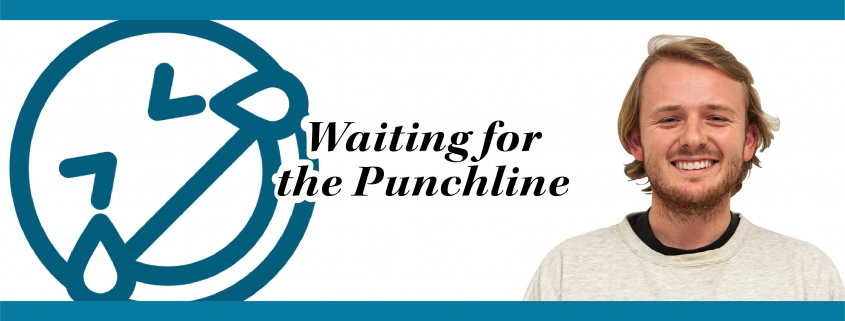Waiting for the Punchline: Comedy is only getting darker and more extreme

A former friend of mine used to joke about people having “white” and “dark” Air Force 1 energies, in reference to the popular Nike shoes worn by sorority girls, drug dealers and NFL owners alike. Seemingly wholesome, good and nonthreatening people have white Air Force 1 energy; those who seem shifty, untrustworthy and questionably evil have dark. Easy enough of a concept to grasp, right?
Well, what happens when the lines between light and dark are blurred? Sometimes I’d laugh my ass off at Anthony Jeselnik clips and my friend would mutter a passing comment that Jeselnik had “maddd dark Air Force 1 energy, dude.” But if Jeselnik was so dark and evil, why did he bring me so much joy? Is there something wrong with me for liking it?
Truthfully, the differences between light and dark are not so obvious. If we’re going by the previous descriptions of light and dark, that friend eventually proved to be dark Air Force 1 energy masquerading as white Air Force 1 energy, judging by his questionable actions rather than the things he would say (i.e. lies, manipulation, selfish behavior — you get the picture). This metaphor is probably a bit outlandish, so I will cease the comparison. Still, this binary of light and dark fascinated me, and the lines have only gotten more blurred in terms of the entertainment we consume and enjoy.
For years, television and film programming were more explicit in their definitions of light and dark, good and evil, moral and immoral. The good cowboys wore white hats and the bad cowboys wore black hats. The “bad guys” talked about death and despair, while the good guys talked about justice and righteousness. Comedy’s most celebrated voices were often light, silly and clean in their material, while the less-respected comics resorted to coarse, vulgar and taboo subjects in their work.
Since then, mainstream comedy has only gotten darker and darker. Louis C.K. was probably the most respected and prominent voice in comedy of this century. Yet, his material was almost exclusively dark and taboo. Critics and audiences adored him because he was so open and hilarious about the things we all think about but are too afraid to openly discuss. We trusted him to be someone who wouldn’t actually act upon them, too. His credibility was lost once audiences learned about accusations of sexual misconduct that surfaced in 2017, at the height of the #MeToo and #TimesUp movements.
While today, C.K. certainly isn’t the cultural force he was a decade ago, his success certainly reflected a change in mainstream preferences for dirtier, more extreme material. Even wildly popular “family” comedians like Kevin Hart and Gabriel Iglesias have plenty of vulgar or “blue” material at their disposal. Today, it’s especially impossible to imagine a “clean” comic like Bill Cosby having the kind of massive success that he did in the ’60s or ’70s. Although, if we’re being honest, there are much better reasons for that than just his material.
The one exception to this dark and dirty rule is the massive success of John Mulaney. Still, to be fair, “Big Mouth” is one of the funniest shows about adolescent taboos, and it’s the brainchild of Mulaney and fellow comic Nick Kroll.
The youth have especially gone dark too. Go to any USC open mic (well, maybe next year), and I guarantee you at least half of the performances will consist of jokes about anxiety and depression. In fact, it’s fascinating to think that joking about one’s mental health has become so commonplace that it could be considered a hack at this point. As well, some of the most widely circulated TikToks during the coronavirus pandemic have come from an elementary school-aged kid with a drop-dead hilarious penchant for gallows humor.
With television, a show like “The Sopranos” was so groundbreaking because no show had ever before challenged genre conventions or audiences’ notions of good and bad. The main characters were deeply flawed (to say the very least), wildly entertaining and surprisingly likable. Never before were audiences so inclined to empathize with characters as objectively awful as the Soprano family. It didn’t matter that Tony Soprano was a mob boss. He could’ve been an attorney or a plumber — the themes and lessons would still be the same.
Yet, while “The Sopranos” had fantastic comedic writing and funny moments in each episode, the groundbreaking series was a drama through and through. Still, the series’ widespread critical and commercial success opened the door for so many genre-defying series that remain popular today.
When one looks at the “Outstanding Drama Series” nominees from the 2010s Emmys, many of the shows — including “Orange Is The New Black,” “Better Call Saul,” “Succession” and “Killing Eve” — have much more in common with dark comedies than traditional dramas like “The West Wing” or “Dallas.” The inverse is also true for recent “Outstanding Comedy Series” nominees — including “Fleabag,” “Barry,” “Russian Doll” and “Atlanta” — which are infinitely darker and more serious than “The Office” or “Two and a Half Men” from just 10 years ago.
What does all this mean? Audiences are demanding more nuance and risk than ever, and it’s made for way better television. Dramas have never been funnier and comedies have never been more serious. Creatives trust audiences to know the difference between right and wrong. They trust audiences to be smart enough to not look at a film or television show to learn how to behave in real life. They know audiences consume art to feel a sense of comfort or solidarity in their own flawed humanity. Real life is complicated and our entertainment should be as well.
Matthew Philips is a senior writing comedy. He is also the wellness & outreach director for the Daily Trojan. His column, “Waiting for the Punchline,” typically runs every other Thursday.

